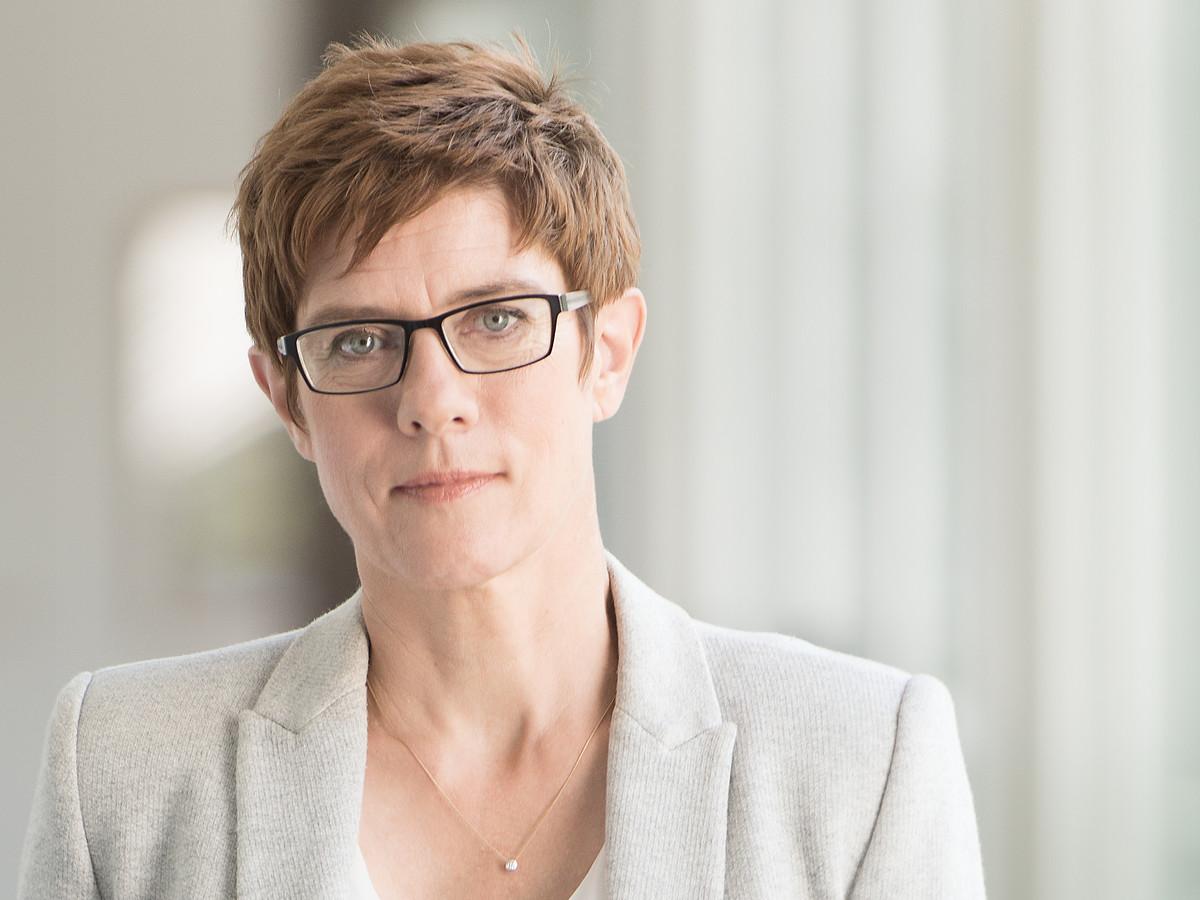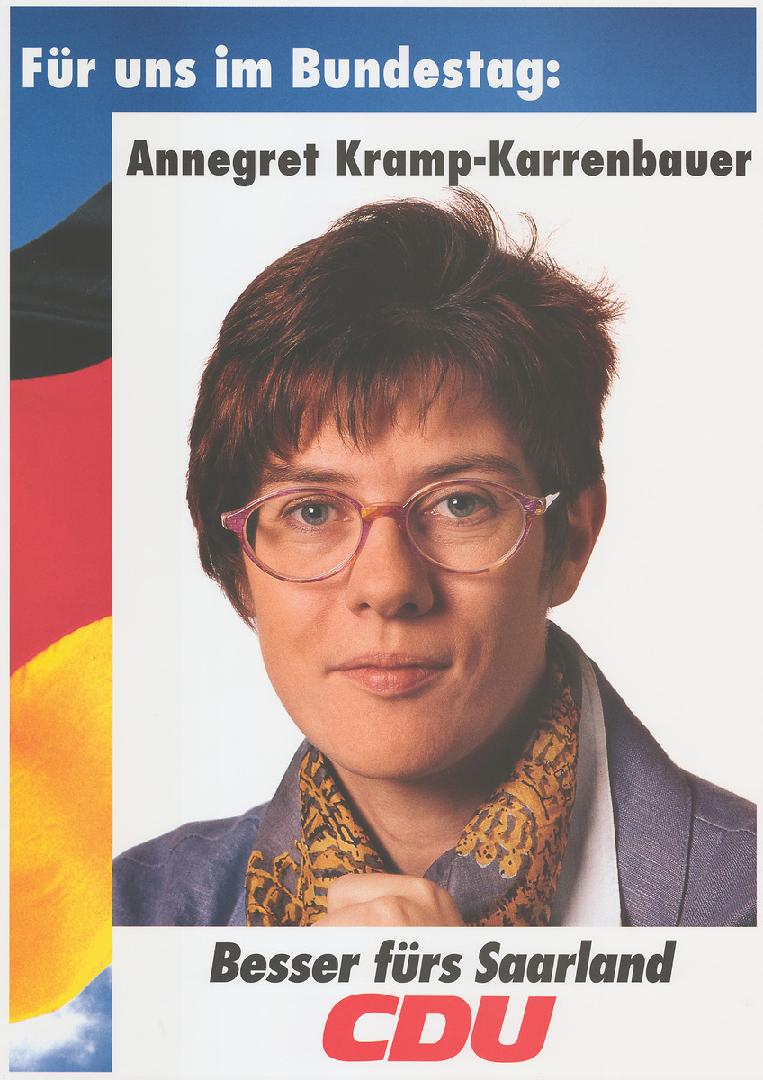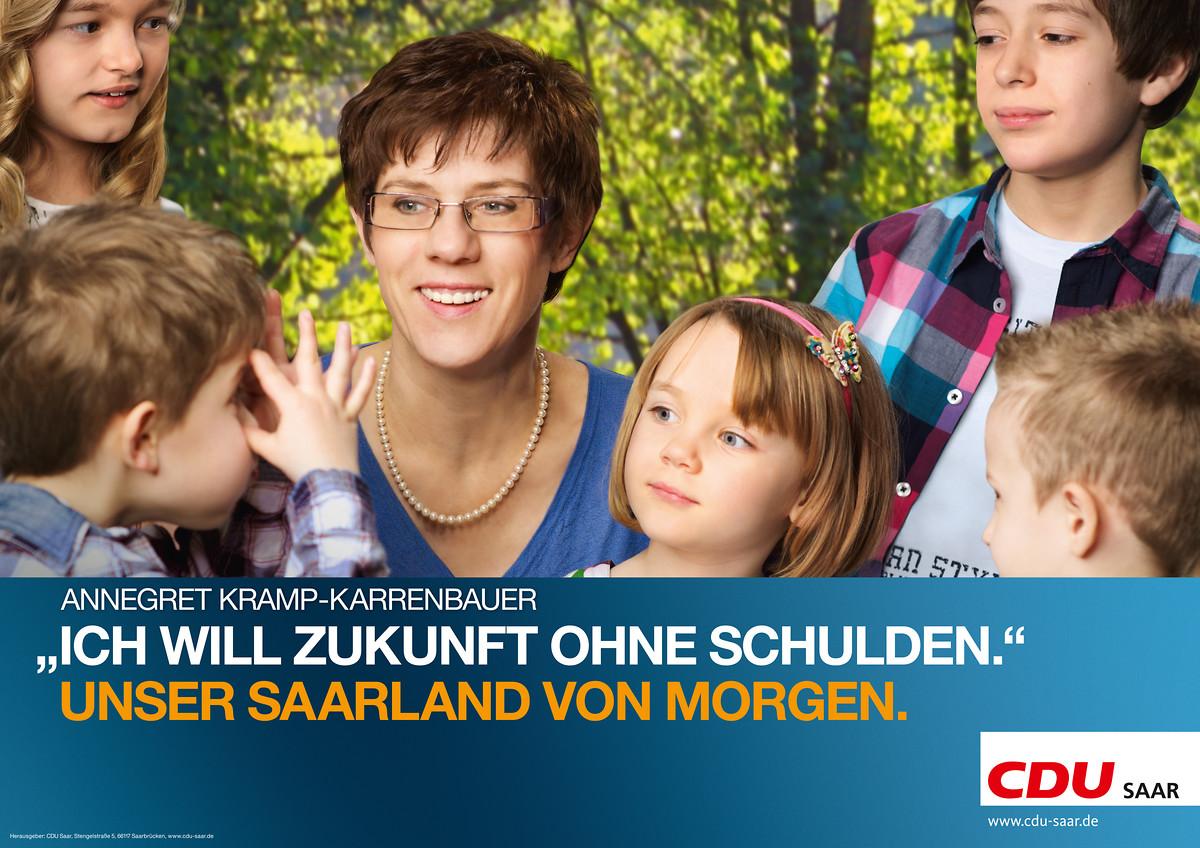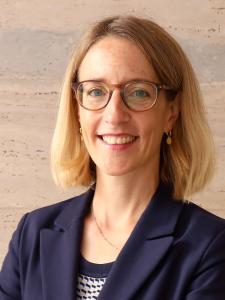Overview – Skip to a certain paragraph:
☛ Background, Studies and Entry into Politics
☛ From the Saarland to Berlin and Back Again
☛ First Female Interior Minister in the History of the Federal Republic
☛ Minister President and CDU Chairwoman
☛ Resignation from party leadership
Background, Studies and Entry into Politics
Annegret Kramp-Karrenbauer was born in Völklingen on 9 August 1962. Her father was the headmaster of a special needs school, her mother was a housewife. Together with her five siblings, she grew up in Püttlingen, where she attended primary school, later attending high school in Völklingen, where she completed her secondary education in 1982. In 1984, she began studying law and politics at university; in the same year she married Helmut Karrenbauer, a mining engineer. The couple have three children (born in 1988, 1991 and 1998) and live in Püttlingen. In order to support his wife in her political career, her husband scaled down his own professional activities so as to take care of the children and the household.
For Kramp-Karrenbauer, whose parents were conservative Catholics, politics played an important role from an early age. She joined the CDU at eighteen and was elected to the council of her home town, Püttlingen, four years later. She also gained experience of local government as an alderwoman of the town (1989–1994). In the CDU's youth organisation, Junge Union, where she sat on the Saarland regional committee from 1985 to 1988, she got to know Peter Müller, who later became Minister President of the Saarland. After graduating from university, the first steps in her professional career led straight into politics, with a job working on policy and planning for the Saar CDU, which she did from 1991 to 1998.
From the Saarland to Berlin and Back Again
In 1998, it looked as if she would leave the Saarland for politics at the national level. In the January of that year, Klaus Töpfer had resigned his membership of the Bundestag in order to move to the United Nations as the executive director of the environmental programme in Nairobi. For a few months, Kramp-Karrenbauer represented the Saarbrücken-Land constituency in the Bundestag as a replacement for Töpfer. In the general election on 27 September 1998, she lost her seat to the SPD candidate and so could not return to parliament in Bonn. It was one of the few setbacks of her political career. Instead of moving with the Bundestag itself to Berlin, she became a personal aide to Peter Müller, the CDU's lead candidate for the Saarland state election on 5 September 1999. On the day, the CDU won a striking election victory. After fourteen years in opposition, it not only formed a government with Müller as minister president, but also won an absolute majority of the parliamentary seats with 45.5 percent of the vote. Kramp-Karrenbauer, who in the meantime had become the regional chairwoman of the Frauen Union (the CDU women's organisation), entered the Landtag for the first time and was immediately appointed the parliamentary secretary of the CDU group.
First Female Interior Minister in the History of the Federal Republic
In November 2000, Minister President Müller appointed Kramp-Karrenbauer to succeed Klaus Meiser, who had resigned as Minister of the Interior. Although the appointment took her completely by surprise, she was evidently proud to be the first woman to enter this previously male domain. She headed the Ministry of the Interior for seven years, during which time she gained a reputation as a calm, factual, pragmatic, reliable and competent politician. After the Saarland state election on 5 September 2004, in which the CDU successfully defended its absolute majority, the remit of the ministry was enlarged to include departments for family and women.
In a cabinet reshuffle in September 2007, Kramp-Karrenbauer, who by then had also been the deputy national chairwoman of the Frauen Union for six years, moved to head the Ministry of Education, Family, Women and Culture. At the time, Ursula von der Leyen was radically modernising the Union's family policy as a federal minister in Berlin. The compatibility of family and work, in particular issues such as the parental allowance and crèche expansion, now had a high priority on the political agenda, and in the Saarland Kramp-Karrenbauer gave them her full attention. In January 2008, she took over the rotating chair of the Conference of Ministers of Education. In this position, she focused on issues related to early childhood and vocational education, as well as working to improve equality of opportunity.
In the state election on 30 August 2009, despite an energetic campaign, Minister President Müller failed to hold onto the absolute majority with which he had governed the Saarland since 1999. The CDU remained the strongest party in the Landtag, however, and Peter Müller was again nominated and confirmed as the head of the state government. He formed a coalition between the CDU, the Greens and the FDP, and in November 2009 Kramp-Karrenbauer was appointed Minister for Labour, Family, Prevention, Social Affairs and Sport (dt. Ministerin für Arbeit, Familie, Prävention, Soziales und Sport). In this position, she launched a nationwide initiative to make the social professions more attractive to young people and to women returning to the jobs market; she also focused on single parents with the aim of improving their situation. In connection with this, she called on businesses to create better conditions for reconciling the demands of work and family, in particular by introducing flexible working hours and tele-jobs.
Minister President and CDU Chairwoman
By early 2011, when it was becoming increasingly clear that Minister President Peter Müller would withdraw from politics to become a judge in the federal constitutional court, Kramp-Karrenbauer had long earned a reputation as a political all-rounder with multiple talents. She had headed three different ministries in the previous ten years and although, as the Minister for Social Affairs, she bore the responsibility for recent harsh cuts in the welfare system, the opinion polls still rated her as the most popular politician in the Saarland. So in the end, it came as no surprise when Müller nominated Kramp-Karrenbauer, who he had been promoting for decades, as his successor. She quietly reached an understanding with Interior Minister Stephan Toscani, who was also interested in the post of minister president, in order to avoid a potentially damaging contest within the party. She was also to take over the state chairmanship of the CDU from Müller.
At the grassroots, the party members agreed with Müller's choice of candidate. Kramp-Karrenbauer was considered to be on the left wing of the party and was thus representative of the vast majority of the Saar CDU, which has always had a strongly social profile. At the party conference in May 2011, the delegates rewarded her with a fantastic result, electing her as the CDU state chairwoman with 326 of the 342 votes cast. The change in the State Chancellery was planned to go just as smoothly – after all, the FDP and the Greens as the coalition partners had signalled their willingness to work with Kramp-Karrenbauer as minister president. On 10 August 2011, the members of the Saarland Landtag expected a routine election to the office. Then Heiko Maas, the state chairman of the SPD, unexpectedly came forward as a candidate. The vote ended in a draw: 25 votes each. In the second ballot, Kramp-Karrenbauer won by the slenderest of margins. Yet she kept her cool through the nail-biting uncertainty of the election. As she remarked afterwards, "The most difficult births produce the most beautiful children".
Kramp-Karrenbauer became the first woman to govern the Saarland, the smallest – and the poorest – non-city state in the Federal Republic. Her freedom of action as minister president was correspondingly narrow; a strict austerity policy had dictated state politics for years. In response to an impending budgetary crisis, the Saarland had been placed under supervision in May 2011 by the Stability Council, a joint body formed by the federal and state governments. This led Kramp-Karrenbauer to declare, after her election, that the most important goal was to maintain the Saarland's capacity for independent action. Debt reduction and tough negotiations between the federal and state governments over a new financial package would dominate her workload in the coming years. Against the background of its precarious financial situation, she temporarily cast doubt on the Saarland's compliance with the so-called 'debt brake'; again and again she raised the topic of an increase in the top income tax rate, which would be to the benefit of her small state.
Kramp-Karrenbauer’s readiness to take a calculated risk became evident only a few months after her election: on the day of the FDP's traditional new year meeting in January 2012, she announced that she was dissolving the coalition. Quarrels within the Saar FDP, she explained, had rendered it unable to function in government. After briefly holding exploratory talks with the SPD, she ultimately spoke in favour of holding new elections.
Many people criticised the Minister President's decision, not least Chancellor Angela Merkel, who thought that the risk was too great. Indeed, Kramp-Karrenbauer herself later admitted that she had bet everything on one roll of the dice. Her hunch turned out to be right: despite the predicted head-to-head race with the SPD, the CDU clearly won the state election on 25 March 2012. The CDU and SPD quickly agreed the terms for a grand coalition in the Landtag, not least because Kramp-Karrenbauer had a good working relationship with the SPD state chairman, Heiko Maas. On 9 May 2012, she was elected minister president for the second time.
Grand Coalition
Kramp-Karrenbauer sat firmly in the saddle from the start and did not shy away from conflicts. On issues at national level, too, she was ready to take uncomfortable positions and to stand by them: for instance, she described the extension of the operational life span for nuclear power plants in 2010 as a mistake and she voiced her opposition to the CSU's insistence on introducing the home childcare allowance. Among the measures that she supported, two in particular were close to her heart. Firstly, she argued in favour of a quota for women in businesses – whether it took a flexible or a rigid form was less important to her than the existence of a legal requirement at all. Secondly, she was among the CDU's early advocates of a statutory minimum wage, approaching the issue as pragmatically as she did the quota for women: a minimum wage, she asserted in March 2012, would be introduced sooner or later anyway, so it would be better to do so right now in a form that would be largely decided by the CDU and which would be sensible and business-friendly.
One of the concerns that is closest to Kramp-Karrenbauer's heart is Franco-German friendship and the cultivation of a shared culture. From 2011 to 2014, she was the Federal Republic's commissioner for cultural affairs under the provisions of the treaty on Franco-German cooperation. Under her leadership, the state government formulated a comprehensive strategy for relations with France at the beginning of 2014, which aimed to make the Saarland indispensable, both as a bridge into Germany and as a gateway to France. For her work in this field, she has received several awards.
Re-election
In November 2012, Kramp-Karrenbauer was re-elected as the state chairwoman of the CDU, even managing to increase her vote slightly from 95.6 to 98.2 percent. Her huge popularity at the grassroots level was due not least to the fact that she kept an independent mind and asserted herself confidently against the federal echelons of the party – almost a traditional hallmark of the Saar CDU: "We have a mind of our own and we won't let ourselves be swayed, no matter what others in the party say about it", she called to the delegates, who responded with loud applause. The picture was much the same four years later: in September 2016, she was selected with 98.4 percent as her party's lead candidate in the 2017 state election.
The fact that she occasionally went her own way did not damage Kramp-Karrenbauer's status in the party at the national level either – on the contrary, her authentic demeanour, competence, straightforwardness and objectivity were valued. Having been elected to the Presidium of the CDU (dt.: CDU-Präsidium) for the first time in 2010 with an aggregate vote of 57.45 percent, she managed to raise her share to 83.86 percent in 2012. In 2014, she was re-elected by the delegates with 85.16 percent, the best result among the candidates, and in 2016 with 85.2 percent, the second best result.
In the Saarland state election on 26 March 2017, the CDU, with Annegret Kramp-Karrenbauer as the lead candidate, increased its share of the popular vote to 40.7 percent, up from 35.2 percent in the 2012 election. The SPD, in contrast, failed to build on the 30.6 percent that it had achieved five years earlier, polling only 29.6 percent. The grand coalition was extended nevertheless and Kramp-Karrenbauer was re-elected minister president with a large majority.
CDU General Secretary
After the general election on 24 September 2017, Kramp-Karrenbauer became closely involved in the coalition talks at national level. There was repeated speculation about a possible move from the Saarland to Berlin. In February 2018, the moment came at last: at the request of Chancellor Angela Merkel, Kramp-Karrenbauer was to become the CDU's new general secretary. The position had recently been left vacant by the resignation of Peter Tauber.
It came as a surprise, however, that Kramp-Karrenbauer had given up the position of minister president to take over a post in the party organisation. It had rather been expected that she would become a member of the new cabinet. Kramp-Karrenbauer herself explained that she had deliberately chosen the position of general secretary over a ministerial office.
She saw it as a key task to renew the party's mission and to make the CDU manifesto of 2007 fit for the future. “We need to develop a political programme that will take us into the 2030s. That is why it will be the main focus of work for the next few years”, she declared at the 30th national party conference in Berlin. On 26 February 2018, the conference delegates elected her General Secretary of the CDU with 98.8 percent. She thus became the second woman to occupy this position, after Angela Merkel.
She set to work in her new position with energy and conviction. As promised, she paid particular attention to working out a new party platform. From April to September 2018, the new general secretary went on a listening tour with around fifty events, at which she discussed things with party members, taking note of their questions and ideas with regard to a new political programme.
CDU Chairwoman
At the end of October 2018, Chancellor Angela Merkel announced that she would not offer herself for re-election to the party chair at the upcoming party conference in December. Shortly afterwards, Kramp-Karrenbauer announced her own candidacy for the office. She was seen as the Chancellor's preferred candidate, but Federal Minister of Health Jens Spahn, who also sat on the CDU national committee, and Friedrich Merz, the former chairman of the CDU/CSU parliamentary group, also announced that they would stand.
In the following weeks, the three candidates attended a total of eight regional conferences, at which they answered questions from party members. The lively debate and the fair competition were well received in the media. Hardly anyone dared to predict which candidate would be elected at the upcoming party conference. On 7 December, at the 31st national party conference of the CDU in Hamburg, Kramp-Karrenbauer received 45 percent in the first ballot and had to go into a runoff against Friedrich Merz, who received 39 percent. Jens Spahn managed only 16 percent and thus dropped out of the race. Kramp-Karrenbauer won the second ballot by a narrow margin with 51.75 percent and was elected national chairwoman of the CDU.
Resignation from party leadership
In the months that followed, Kramp-Karrenbauer pushed ahead with the internal review of the CDU's party platform. At the same time, the question of who would be the CDU candidate for chancellor in the 2021 general election loomed ever larger. The pressure on the party chairwoman increased in February 2020, when FDP politician Thomas Kemmerich was elected Minister President of Thuringia in the third ballot with votes not only from the CDU, but also from the AfD. Kramp-Karrenbauer categorically rejected cooperation with the AfD on the far right or Die Linke on the far left. “The AfD stands against everything that defines us as the CDU. Any rapprochement with the AfD weakens the CDU”, she declared on 10 February. On the same day, she announced that she would not offer herself as a candidate for chancellor and that she would hand over the party chair to the person selected as the CDU's chancellor candidate.
Shortly afterwards, the corona pandemic reached Germany. The party congress, at which a new chairman is to be elected – it was actually planned for April 2020 - has to be canceled. The party congress will not take place until January 2021, digitally for the first time due to the pandemic. The North Rhine-Westphalian Prime Minister Armin Laschet is elected as the new chairman.
In her farewell speech, Kramp-Karrenbauer looks back and explains that the CDU found itself in an existential, difficult situation after the events in Thuringia in February 2020. "It was about the soul of the party," said the chairwoman. "At the time I felt that as party leader I no longer had enough authority and support to get our party through this difficult phase unscathed," explains Kramp-Karrenbauer. "The step to clear the way for a new party leader was difficult, but it was well thought out and it was the right one."
Tribute is paid to Kramp-Karrenbauer in the press for her self-determined resignation. And their successes are also recognized, for example the introduction of the women's quota in the CDU. She also managed to ease the conflict-ridden debate in the Union about the refugee crisis by giving internal party critics a chance to speak. Not least because of this, she made it possible for the CDU and CSU to be reconciled after difficult months.
Finally, Kramp-Karrenbauer appealed in her speech: "Let's all support our new chairman of the CDU. Let's stand together for a modern and open CDU, for a union that sticks together, for a CDU that is more closely connected to the local people than any other party. Let's work together for our country."
Federal Minister of Defence
In June 2019, Kramp-Karrenbauer will assume responsibility for another position. After the European elections in May 2019, the European Parliament elected Ursula von der Leyen as the new President of the European Commission. Before that, she resigned as Federal Defense Minister. In order to further intensify the cooperation between the party and the government, Kramp-Karrenbauer takes over the office. On July 24, 2019, she will be sworn in as Federal Minister of Defence. In her first government statement, she emphasizes the special relationship "between parliament and the parliamentary army, between the German Bundestag and the Bundeswehr" and expresses her great respect for the soldiers. It also acknowledges Germany's responsibility for the international peace order and its obligations to NATO. "Germany is and will remain firmly anchored in the transatlantic alliance, is and will remain firmly anchored in NATO."
After her resignation as party leader, Kramp-Karrenbauer will continue to focus on her work as defense minister. During this period, the KSK elite group was reformed, which had become necessary after a massive accumulation of right-wing extremist incidents. During the German EU Council Presidency from July to December 2020, she will work to develop a European threat analysis and a "strategic compass for Europe". Their goal is to strengthen the “military power of Europe”. She takes the concerns of the Eastern European member states in particular seriously and questions the benefits of the Nord Stream 2 gas pipeline. She repeatedly emphasized the real danger posed by Russia and called for better equipment for the Bundeswehr: "Anyone who wants to live safely must be able to credibly demonstrate that they are capable of defending themselves."
The problems of procurement, which already occupied her predecessor Ursula von der Leyen, remain unsolved: "AKK" does not succeed in the urgently needed modernization. Even in the dispute over armed drones to defend the Bundeswehr, she was unable to assert herself against her coalition partner, the SPD, who rejected the project.
Her final weeks in office are marked by the unfolding events in Afghanistan. Despite numerous tips, the German government was surprised by the rapid advance of the Taliban. As a result of this misjudgment, the Bundeswehr will start an unprecedented evacuation campaign in August 2021 to evacuate embassy staff and local staff from Afghanistan. In early summer, Kramp-Karrenbauer calls for a comprehensive evacuation of Afghan local forces earlier than others in order to protect them from the advancing Taliban, but is unsuccessful. In the days of the evacuation, she is in constant contact with Brigadier General Jens Arlt, who is in charge of the operation in Kabul, and promises: "Whatever happens there: I'll hold my head."
Withdrawal from politics
The Union suffers significant losses in the federal elections on September 26, 2021. Kramp-Karrenbauer loses her constituency to the SPD, but enters the Bundestag via the state list of the Saar-CDU. Together with Peter Altmeier, who had also lost his constituency, she decided to give up her mandate and make way for the younger CDU politicians Nadine Schön and Markus Uhl. With their decision, Altmeier and Kramp-Karrenbauer want to make their contribution to the renewal of the CDU - for which they are shown respect
The original german text was translated by Richard Toovey.
Curriculum vitae
- 1981 Joins the CDU
- 1982 Completes secondary education (Abitur)
- 1982–1990 Studies law and politics at the universities of Trier and Saarbrücken
- 1984–2000 and since 2009 Member of Püttlingen town council
- 1989–1994 and 1999–2000 Alderwoman of the town of Püttlingen
- 1990 Magister Artium
- 1991–1998 Works on policy and planning for the Saar CDU
- 1998–2021 Member of the Bundestag
- 1998–2021 Chairwoman of the CDU branch in Püttlingen
- 1999 Personal aide to the chairman of the CDU parliamentary group in the Landtag
- 1999–2018 Member of the Saarland Landtag
- 1999–2012 Chairwoman of the Saar Frauen Union
- 1999–2000 Parliamentary secretary of the CDU group in the Landtag
- 2000–2004 Saarland Minister for the Interior and Sport
- 2003–2011 Deputy chair of the Saar CDU
- 2003–2019 Deputy national chairwoman of the Frauen Union
- 2004–2007 Saarland Minister for the Interior, Family, Women and Sport
- 2007–2009 Saarland Minister for Education, Women, Family and Culture
- 2009–2011 Saarland Minister for Labour, Family, Prevention, Social Affairs and Sport
- 2011–2018 Chairwoman of the Saar CDU
- 2011–2018 Minister President of the Saarland
- February to December 2018 General Secretary of the CDU
- 2018–2021 Chairwoman of the CDU
- 2019–2021 Federal Minister of Defence
Literature
- Dunz, Kristina, Quadbeck, Eva: Ich kann, ich will und ich werde. Annegret Kramp-Karrenbauer, die CDU und die Macht. Berlin 2018.
- Otzelberger, Manfred: Die Macht ist weiblich: Annegret Kramp-Karrenbauer. Die Biografie. München 2018.






